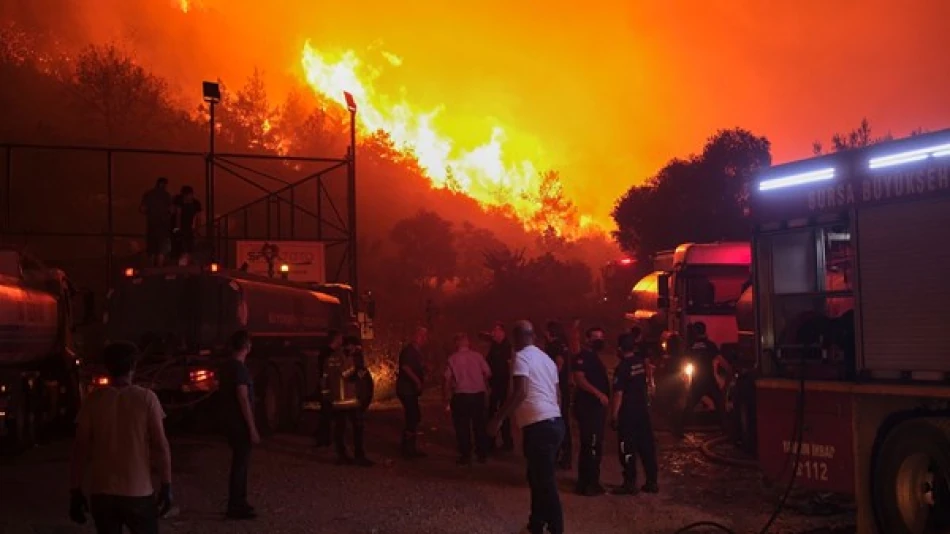
Massive Forest Fires Prompt Evacuation of Thousands in Turkey
Turkey Battles Unprecedented Wildfires as Mediterranean Heat Wave Breaks Temperature Records
Turkey is confronting a severe wildfire crisis as extreme temperatures across the Mediterranean region fuel blazes that have forced the evacuation of over 3,600 people from multiple provinces. The fires, intensified by a historic heat wave that pushed southeastern Turkey to a record-breaking 50°C (122°F) on Saturday, highlight the growing threat of climate-driven disasters in a region already vulnerable to extreme weather events.
Scale of the Crisis
Agriculture and Forestry Minister Ibrahim Yumaklı reported that firefighters have largely contained blazes in the southern provinces of Mersin and Antalya, as well as central Uşak province. However, active fires continue to rage in northwestern Bursa province and northern Karabük, where challenging conditions are hampering suppression efforts.
The Bursa fire, which erupted Saturday, forced authorities to temporarily close sections of the major highway connecting Istanbul to western Izmir. Dramatic footage showed flames consuming forests near residential areas while smoke blanketed the city's skyline, underscoring how quickly these fires can threaten urban populations.
Emergency Response Mobilization
Turkish authorities have deployed substantial resources to combat the fires. In Bursa's Kestel district alone, approximately 1,765 people have been evacuated, with 2,000 firefighters supported by six firefighting aircraft and four helicopters battling the massive blaze. The Karabük fires, burning for five consecutive days, have prompted the evacuation of 1,839 residents from 19 villages, with three planes and 16 helicopters engaged in suppression efforts.
Historic Heat Wave Amplifies Fire Risk
Turkey's meteorological service forecasts temperatures exceeding 40°C (104°F) across multiple regions on Sunday, representing 6-12 degrees above seasonal averages. Saturday's unprecedented 50°C reading in southeastern Turkey marks the highest temperature ever recorded in the country's meteorological history, signaling a dangerous escalation in regional climate extremes.
"We are going through dangerous times. This situation apparently won't end within two or three days," Minister Yumaklı warned, acknowledging the prolonged nature of the heat wave and its implications for fire suppression efforts.
Regional Context and Climate Implications
Turkey's current crisis reflects broader Mediterranean climate trends that have increasingly plagued the region over the past decade. Similar extreme fire seasons have devastated Greece, Italy, and Spain in recent years, with 2021's fires in Turkey alone burning over 140,000 hectares and killing eight people. The eastern Mediterranean basin is warming faster than the global average, creating conditions that extend fire seasons and intensify blazes.
Economic and Environmental Consequences
Beyond immediate safety concerns, these fires pose significant economic risks to Turkey's tourism industry, which relies heavily on Mediterranean coastal regions. The disruption of major transportation arteries, as seen with the Istanbul-Izmir highway closure, demonstrates how quickly wildfires can impact critical infrastructure and economic activity.
The repeated evacuation of thousands of residents also strains Turkey's emergency response systems and highlights the growing need for climate adaptation strategies. As extreme weather events become more frequent and severe, the country faces mounting pressure to invest in fire prevention, early warning systems, and resilient infrastructure.
Looking Ahead: A New Normal
Turkey's current wildfire emergency represents more than a seasonal challenge—it signals a fundamental shift in the country's risk profile. With climate models predicting continued warming and more frequent extreme weather events across the Mediterranean, Turkish authorities must prepare for increasingly complex fire seasons that threaten both rural communities and major urban centers.
The record-breaking temperatures and widespread evacuations serve as a stark reminder that climate change is not a distant threat but a present reality reshaping life across one of the world's most historically temperate regions.
Most Viewed News

 Layla Al Mansoori
Layla Al Mansoori






